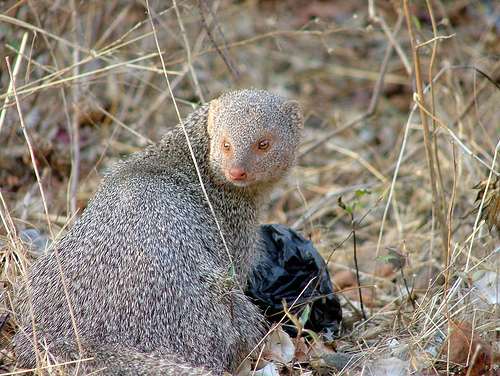December 3, 2011


In California alone, consumers use upwards of 19 million plastic bags per year, which require approximately 8 million barrels of oil to produce. What’s more, about 90 percent of the bags used in the United States never get recycled. Globally, of the 500 billion of the single-use, flimsy bags we go through, many end up either in landfills or as wind-blown or ocean gyre litter that are consumed by wildlife and marine life, resulting in many painful deaths. For many environmentalists and concerned consumers, plastic bags represent public enemy number one. (Photo by Vaidyarupal, Flickr)
[nggallery id=66 template=carousel images=4] [imagebrowser id=66] UPDATE December 20, 2011—Seattle has passed a ban on plastic bags. The ordinance takes effect July 1 and includes a 5-cent tax on paper grocery bags. By Debra Atlas
In California alone, consumers use upwards of 19 million plastic bags per year, which require approximately 8 million barrels of oil to produce. What’s more, about 90 percent of the bags used in the United States never get recycled. Globally, of the 500 billion of the flimsy, single-use bags we go through, many end up either in landfills or as wind-blown or ocean gyre litter that are consumed by wildlife and marine life, resulting in many agonizingly painful deaths. For many environmentalists and concerned consumers, plastic bags represent public enemy number one.
Across the globe, cities, counties, and countries are grappling with this environmental disaster. Countries that have banned their use include Italy, Thailand, Bangladesh, Israel, and Rwanda, as well as a number of cities in India, Australia, and Canada.
Here in the United States, numerous cities and towns have banned the use of single-use plastic bags. Twelve cities in California alone have done so, including San Francisco, Malibu, Palo Alto, San Jose, Long Beach, and Calabasas. Two other California municipalities, Manhattan Beach and Oakland, also banned them but rescinded the ban due to lawsuits. Manhattan Beach recently won its lawsuit, however, so the ban may soon be back in effect. Bans also are in place in Westport, Connecticut; Aspen, Colorado; Brownsville, Texas; and in both Kauai and Maui, Hawaii. And at least 30 towns in western Alaska have banned the bags.
Many cities have given retailers mandates to cease distributing plastic bags. These primarily affect businesses of a certain size rather than an across-the-board regulation.
A few cities across the country have chosen or are considering other steps to address the use of plastic bags.
Washington, DC, taxes consumers 5 cents per plastic bag, and Virginia is considering doing the same. Madison, Wisconsin, has a mandatory plastic bag recycling law. In New Jersey, a bill was recently introduced that would place a 10-cent fee on every carryout plastic or paper bag at convenience stores, drug stores, supermarkets, or retail stores larger than 1,000 square feet, beginning in 2013. The proposed bill also would not, after the year 2015, let stores hand out bags that are not compostable.
Some retailers also voluntarily have agreed to stop giving plastic bags out to customers.
In 2008, six retailers in Austin, Texas, agreed to a trial ban. H-E-B, Randalls, Walmart, Target, Walgreens, and Whole Foods agreed to try to reduce the amount of plastic bags they sent to landfills by 50 percent. Of these, Whole Foods followed through, fully discontinuing the practice of handing them out at checkout stands.
In a 2009 summary, the Texas Retailer’s Association (TRA) called this voluntary ban a success. Its data showed that over the year-and-a-half, the retailers sold 907,000 reusable bags, increased the plastic bag poundage they recycled by 74 percent, and bought 20 percent fewer pounds of plastic bags. Yet since then, the TRA has been pushing back to keep plastic bags in use.
Nationally, the only retail chains with a “no plastic bag” policy are Whole Foods and, surprisingly, Target. Whole Foods gives customers a 5-cent credit for each reusable bag brought in. Although Target has not officially banned plastic bag use, the clerks at Target will give you the 5-cent credit if customers remind them.
Congress also briefly engaged the issue. Bills were introduced over the past three years to tax and/or ban the use of plastic bags. But these bills have languished in committees, meeting a quiet but certain death. It seems that another recognized environmental threat has been trumped by hard lobbying. Time will tell whether plastic bags are truly on their way out of fashionable use.
For related articles, see: Paper or Plastic? BYOB Time to Bag the Bags
Check out more articles by Debra Atlas. © 2011 SCGH, LLC. ]]>